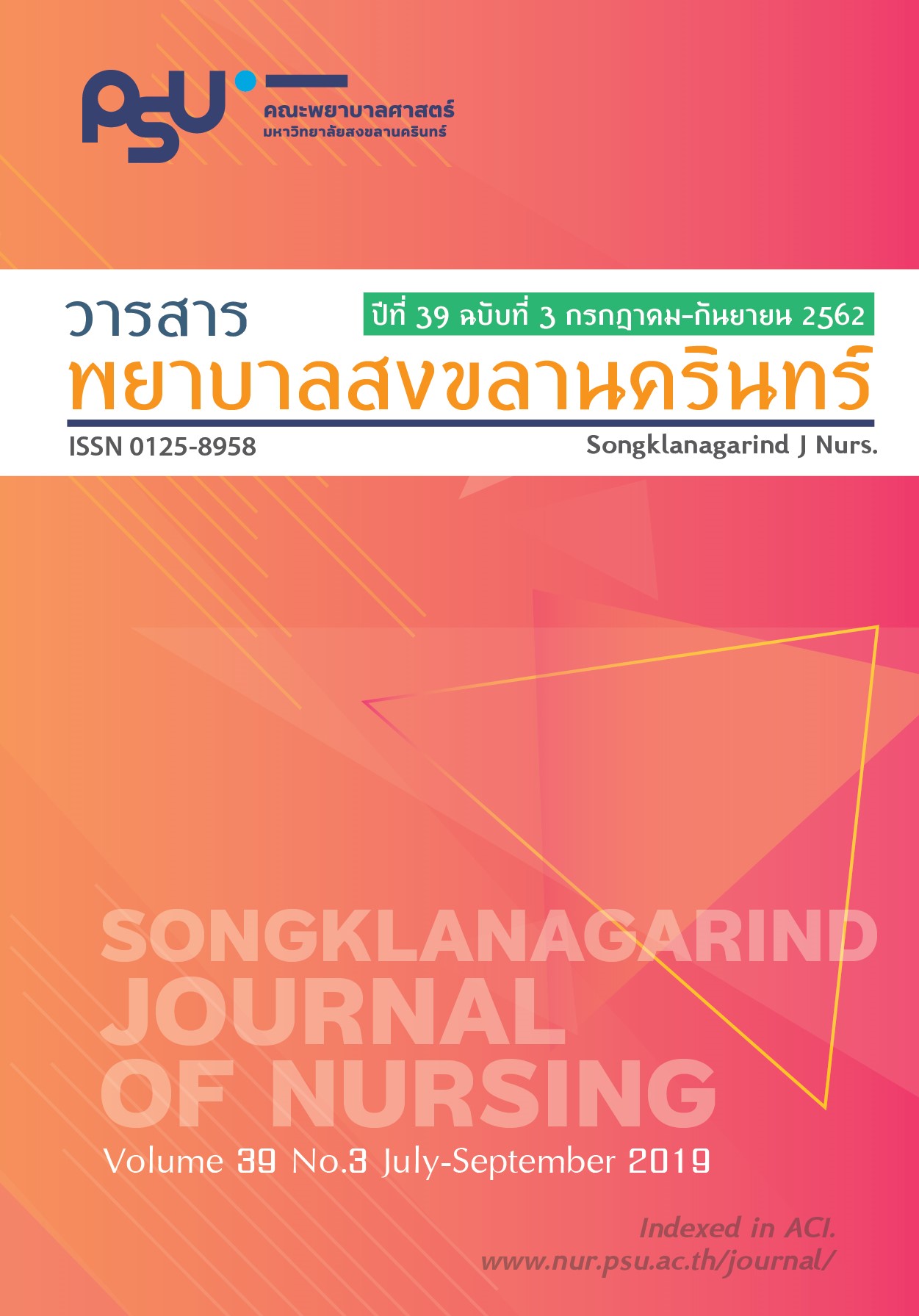ความสัมพันธ์ระหว่างพฤติกรรมการบริโภคโซเดียมและระดับการทำงานของไตในผู้ป่วยโรคเบาหวานที่มีภาวะไตเรื้อรัง
Main Article Content
บทคัดย่อ
การวิจัยภาคตัดขวางเชิงวิเคราะห์นี้ มีวัตถุประสงค์เพื่อศึกษาพฤติกรรมการบริโภคโซเดียม ความสัมพันธ์ระหว่างปริมาณและความถี่ของการบริโภคโซเดียมต่อระดับการทำงานของไตในผู้ป่วยโรคเบาหวานที่มีภาวะไตเรื้อรัง กลุ่มตัวอย่างเลือกแบบบังเอิญจากผู้ป่วยโรคเบาหวานที่มีระยะเวลาการเป็นโรคไม่เกิน 10 ปี และมีค่าการทำงานของไตในระยะที่ 2-3 จำนวน 267 คน เครื่องมือวิจัย ประกอบด้วย 1) แบบสอบถามข้อมูลทั่วไปและข้อมูลภาวะสุขภาพ และ 2) แบบสอบถามพฤติกรรมการบริโภคโซเดียมจำแนกตามประเภท ปริมาณ และความถี่ ค่าความตรงเชิงเนื้อหาเท่ากับ 0.9 ค่าความเชื่อมั่นเท่ากับ .83 รวบรวมข้อมูลระหว่างพฤษภาคม - สิงหาคม 2561 วิเคราะห์ข้อมูลด้วยค่าความถี่ ร้อยละ ค่าเฉลี่ย ส่วนเบี่ยงเบนมาตรฐาน วิเคราะห์ความสัมพันธ์ด้วยสถิติ Chi-square
ผลการศึกษาพบว่า กลุ่มตัวอย่างมีพฤติกรรมการบริโภคอาหารที่มีโซเดียมประเภทแกงมากที่สุด รองลงมาคือประเภททอด และประเภทน้ำพริก ร้อยละ 51.44, 13.35 และ 9.01 ตามลำดับ ร้อยละ 63.76 บริโภคโซเดียมเกินเกณฑ์ที่กำหนด เฉลี่ย 2,301.06 (SD = 810.39) มก./วัน กลุ่มตัวอย่างระยะ 3b มีพฤติกรรมการบริโภคโซเดียมสูงที่สุด ร้อยละ 85.71 รองลงมา คือระยะ 3a และระยะ 2 ร้อยละ 67.86 และ 57.95 ตามลำดับ และพบว่าความถี่และปริมาณการบริโภคโซเดียมสูงมีความสัมพันธ์กับระดับความรุนแรงด้านการทำงานของไตในผู้ป่วยโรคเบาหวานอย่างมีนัยสำคัญทางสถิติ (p < .01)
บุคลากรสาธารณสุขควรให้คำแนะนำเชิงลึกเกี่ยวกับการบริโภคโซเดียมที่ถูกต้องเพื่อชะลอการเกิดภาวะไตเรื้อรังในผู้ป่วยโรคเบาหวานที่มีประสิทธิภาพ
Article Details
เอกสารอ้างอิง
Kanchuwassiri S. Guideline for screening and treating kidney complications in diabetes and hypertension patients. The Agricultural Co-operative Federation of Thailand; 2012. Thai.
Hill R, Fatoba T, Oke L, et al. Global prevalence of chronic kidney disease–a systematic review and meta-analysis. 2016; [cited 2018 Nov 20] 11: 7. Available from: https:// doi.org /10.1371/ journal. pone: 0158765
Konlaeid S. Practice guidelines for prevention and treatment complications from diabetes (eyes, kidneys, feet). 1st ed. O-Wit (Thailand). Medical Technology Research and Evaluation Institute; 2010. Thai.
Pichaiwong W. Kidney disease from diabetes. J Med Assoc Thai. 2015; Sep-Oct 2015:19-24. Thai.
Dechma J, Durongritichai V, Kijtorntham W. A study of predictable factors of diabetes mellitus complication in the community under King’s nursing theory. J Public Health Nurs. 2013; 27(2): 63-80. Thai.
Thanakitjaru P. Current situation of chronic kidney disease in Thailand. J Med Assoc Thai. 2015; Sep-Oct 2015: 5-18. Thai.
Pongputthipat R. Factors influencing quality of life in patients with chronic kidney disease before renal replacement therapy. J Nurs Assoc Major Northeast. 2013; 31(1): 52-61. Thai.
Theeracoup P. Sodium consumption in chronic kidney disease patients. J Med Assoc Thai. 2013; 21(4): 12-20. Thai.
Nephrology Society of Thailand. Clinical practice recommendation for the evaluation and management of chronic kidney disease in adults 2015. [internet]. 2015; [cited 2017 October 07]. Available from: http://www.neprothai.org/images/. Thai.
World Health Organization. Guideline: Sodium intake for adults and children. 2012; Retrieved 2019 March, Available from: https://apps.who.int/iris/bitstream/handle/10665/77985/9789241504836_eng.pdf?sequence=1
Aekpalakorn W. Thai People’s health survey report by the 5th physical examination 2014. Nonthaburi: Health Systems Research Institute; 2014. Thai.
Sinawat S. Survey report of sodium chloride intake of Thai population. Nonthaburi: Nutrition Division, Department of Health, Ministry of Public Health; 2009. Thai.
Health Education Division, Ministry of Public Health. Consumption behavior of sweet, salty and fat food. Nonthaburi; 2013. Thai.
Lambers Heerspink J, Navis G, Ritz E. Salt intake in kidney disease—a missed therapeutic opportunity?. Nephrol Dial Transplant, 2012; 27(9), 3435-3442.
McMahon J, Bauer D, Hawley M, et al. A Randomized trial of dietary sodium restriction in CKD. J Am Soc Nephrol, 2013; 24(12), 2096-2103.
Provenzano F, Stark S, Steenkiste A, et al. Dietary Sodium Intake in Type 2 Diabetes. Clin Diabetes, 2014; 32(3), 106-112.
Yamane T. Statistics: An Introductory Analysis. 3rd Edition, Harper and Row, New York; 1973.
Greangsinyod W. Reduce sodium, prolong life. Bangkok: The war veterans organization of Thailand under royal patronage of his Majesty the King Printing; 2012. Thai.
Nephrology Society of Thailand. National Health Security Office. Handbook for caring in early stage of chronic kidney disease patients. Bankok; 2012. Thai.
American Diabetes Association. Standards of medical care in diabetes-2014. Diabetes Care, 37(Supplement 1), 2014; S14-S80.
Henry Ford Health System. Chronic kidney disease (CKD): Clinical practice recommendations for primary care physicians and healthcare providers. University of California, Los Angeles; 2011.
Kidney International Supplements. KDIGO Clinical Practice Guidelin for the Management of Blood Pressure in Chronic Kidney Disease. Kidney Int Rep, 2012; 2(5).
Iseki K, Yamagata K, A Practical approach of salt and protein restriction for CKD patients in Japan. BMC NEPHROL, 2016; 17(1), 87.
Suckling J, He J, Markandu D, et al. Modest salt reduction lowers blood pressure and albumin excretion in impaired glucose tolerance and type 2 diabetes mellitus novelty and significance: A randomized double-blind trial. Hypertension, 2016; 67(6), 1189-1195.
Sawanyawisut P. The effect of participatory learning process to modify food consumption behavior of diabetes mellitus patients with nephropathy attending Kumphawapi primary care unit, Udonthani Province, 2013.
Vegter S, Perna A, Postma J, et al. Sodium intake, ACE inhibition, and progression to ESRD. J AM SOC NEPHROL, 2012; 23, 165-173.
Yu W, Luying S, Haiyan W, et al. Importance and benefits of dietary sodium restriction in the management of chronic kidney disease patients: Experience from a single Chinese center. INT UROL NEPHROL. 2012; 44(2), 549-556.
He J, & MacGregor A. A comprehensive review on salt and health and current experience of worldwide salt reduction programmes. J Hum Hypertens. 2009; 23(6), 363-384.


